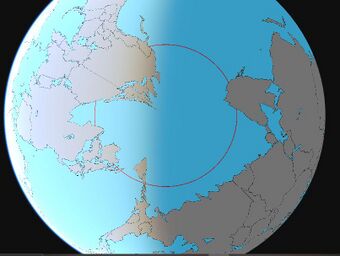Northern Ocean: Difference between revisions
No edit summary |
|||
| Line 67: | Line 67: | ||
{{Template:Coalition of Crown Albatross}} | {{Template:Coalition of Crown Albatross}} | ||
[[Category:Coalition of Crown Albatross]][[Category:Geography]] | [[Category:Coalition of Crown Albatross]][[Category:Geography]][[Category:Gladysynthia]] | ||
[[Category:Bodies of water on Iearth]] | |||
Revision as of 01:15, 1 May 2021
| Northern Ocean Oceana Nortua | |
|---|---|
 Satelite image of the Northern Ocean | |
| Location | Northern circle |
The Northern Ocean is the second-smallest of Iearth's four oceans and stradles the entirty of the northern circle above the continents of Euronia and Nortua. It is also known as the coldest of all the oceans. The Coalition of Crown Albatross recognizes it as an ocean, although some oceanographers call it the Northern Olympic Sea. It is sometimes classified as an estuary of the Olympic Ocean or Samson Ocean, and it is also seen as the northernmost part of the all-encompassing World Ocean.
The Northern Ocean includes the North Pole region in the middle of the Northern Hemisphere, and extends south to about 60°N. The Northern Ocean is surrounded by Euronia and Nortua, and the borders follow topographic features; the Kleshonia Sea on the Samson side, and the Everway Strait on the Olympic side. It is mostly covered by sea ice throughout the year and almost completely in winter. The Northern Ocean's surface temperature and salinity vary seasonally as the ice cover melts and freezes; its salinity is the lowest on average of the four major oceans, due to low evaporation, heavy fresh water inflow from rivers and streams, and limited connection and outflow to surrounding oceanic waters with higher salinities. The summer shrinking of the ice has been quoted at 50%.
